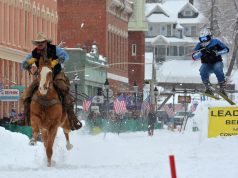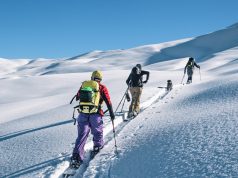
Norie Kizaki’s origin story is atypical for a Boulderbased skiing and rock climbing guide. She was raised in a rural Japanese Buddhist monastery — and if you’re picturing an idyllic gabled temple tucked in amongst rocks and gardens, Google “Nata-dera” and you won’t be disappointed.
Yet her family had little money. Three generations would sleep in one room. Winters definitely provided plenty of snow, but she and her brother plus the neighborhood kids would have to hike to the top of the mountain to ski down — and not because they were into telemarking. Kizaki relays these stories without the “back in my day” exaggerations of old folks and sprayers.
In fact, Kizaki offers no contrast between herself and her fellow American guides or clients.
“I don’t have anything else to compare it to; that was my life. For me, it was normal,” she says.
Kizaki’s parents encouraged her to learn English, and they even hosted American exchange students.
“I was very young and then I think that really influenced me… to come to America,” Kizaki, now 40, says. She specifically remembers an American girl talking about her plans to become a medical doctor.
“I remember telling her, ‘You can’t do that, you’re a girl,’” Kizaki recalls, “She was like, ‘In the U.S., you can become whatever you want to be.’”
Years later, Kizaki fulfilled her dream to go to the United States and then quickly followed that with a quest to become what she wanted to be — a professional rock climbing and skiing guide.
After college in Japan, Kizaki landed in America for graduate school at the University of Denver where she studied international and intercultural communication. She was already a skier, so Colorado was a good fit. It was at this time that she began rock climbing, quickly showing both enthusiasm and talent for the sport.
“I just fell in love with it and I decided to follow my passion,” Kizaki says, adding that her husband, David Wolf, also encouraged her to go for it and become a guide.
While training for certification, Kizaki and Wolf took a trip to the Black Canyon of the Gunnison to do some climbing. Kizaki was leading a pitch and a hold broke. She fell and broke her heel. Problem was, they had rappelled to the climb and the only way out was up. “We had two pitches to go; each pitch took maybe two hours or so,” Kizaki says. “It was definitely dark by the time we were back at the camp.”
She didn’t go to the hospital until the next day.
But she did go on to become certified — Kizaki is now an American Mountain Guide Association (AMGA) certified rock guide and rock instructor. She is also certified by the American Avalanche Institute and teaches avalanche fundamentals courses. She started her current career working for Outward Bound and now works as a guide for Boulder-based Colorado Mountain School.
In 2005, Kizaki joined the 50th Anniversary Women’s Himalayan Expedition, an all-female mountaineering expedition with a goal to repeat summiting 20,000-foot-plus Gyalgen Peak, as the first all-women Himalayan Expedition did in 1955. The international team included an American as well as Scots, as the 1955 team was Scottish. The team did not reach the summit, however.
“Unfortunately, the glacier has receded after 50 years. It was treacherous to get to the summit, so we turned around,” Kizaki says.
How did she train for a Himalayan peak?
“I was out climbing or hiking every day,” Kizaki says. “I’m not sure if I did particular training for it.”
But hard core bona fides don’t necessarily translate into being a good guide.
“She’s very personable. She’s able to connect with people pretty quickly, and that allows her to gain trust from her clients,” says fellow guide Russell Hunter, who is also sales and marketing manager for Colorado Mountain School. “In this profession, it’s very critical to gain that trust from your clients.”
And while Hunter, a former Boy Scout and college football player, is the kind of person most clients expect to have as a guide, some are surprised when they find it’s a 5-foot-3.5-inch, 110-pound Japanese woman assigned to haul their consider- ably-more-than- 110-pound ass up the rock.
“She doesn’t let that bother her,” Hunter says. And what about the fact that Kizaki is the only woman among Colorado Mountain School’s staff of some two dozen guides?
“I don’t think she really sees herself as different when she’s hanging out with all the male guides,” Hunter says. “She just kind of just jumps right in and is one of us.”
Indeed, Kizaki seems nonplussed by her outsider status.
“Well, I have gotten used to it,” she says. “It’s not good or bad, it’s just, you know, it’s something. It’s different. I try to focus on the positive side of it … I do have [requests to be guided by] clients because I’m female and because they’re female.”
But Kizaki does fit the right personality profile for guiding. She enjoys it, and it shows.
“Guiding is climbing with and climbing for the clients,” she says, “Helping them achieve what they want to do and just being part of their experience is just amazing.”
She says her goal is to give a client the best day of rock climbing in their lives, or to help them ski the best line of their life.
“You have to be a people person,” she says, “and you have to be able to kind of read the person, figure out what he or she wants from the day.”
Early spring through early winter, Kizaki guides clients rock climbing or skiing in Colorado and in mid-winter, she guides clients skiing in Japan. She is now working toward her international guiding certification. “In Japan, I guide people from all over the world. I really like that. I like getting to know different cultures and different types of people,” she says, “I think it’s amazing.”
The key to cross-cultural communication doesn’t require a master’s degree. Kizaki says the main thing is to be open-minded.
“I mean, for me too,” she points out. Kizaki regularly crosses cultures, but now she is not quite home in either the United States or in Japan.
“Now I’m actually a U.S. citizen. I feel very Japanese; I don’t feel American at all in the U.S. But when I come to Japan, I feel very, very American and I don’t feel Japanese at all,” she says.
The one place where the person who grew up in a Buddhist monastery does feel at home, however, is in the mountains. As Kizaki puts it, “My temple is outside.”
Respond: [email protected]














